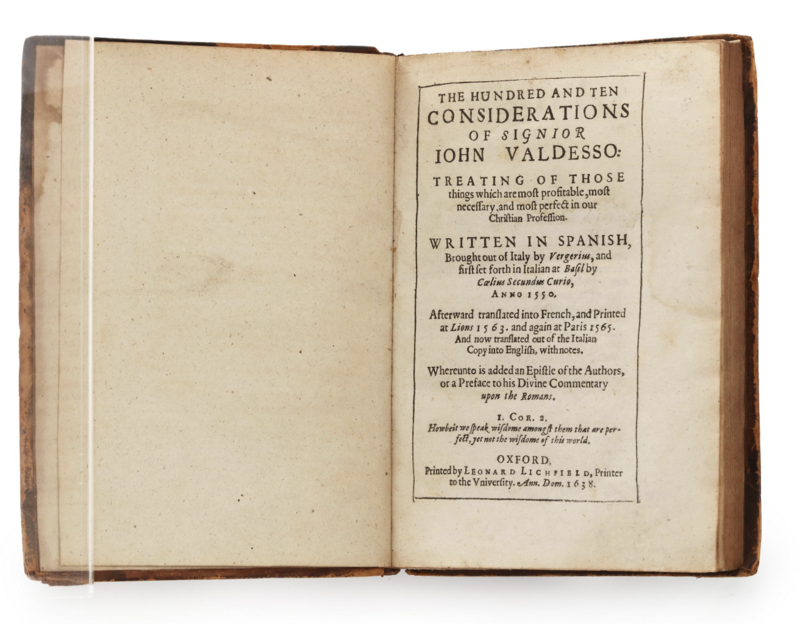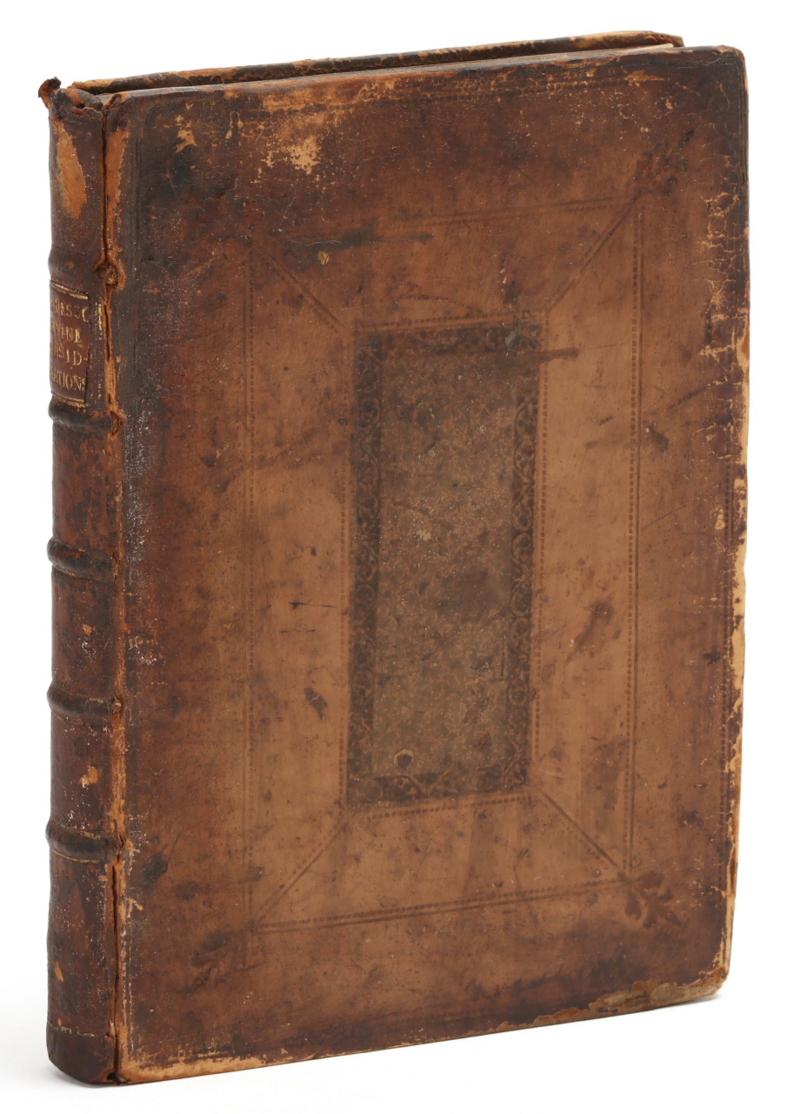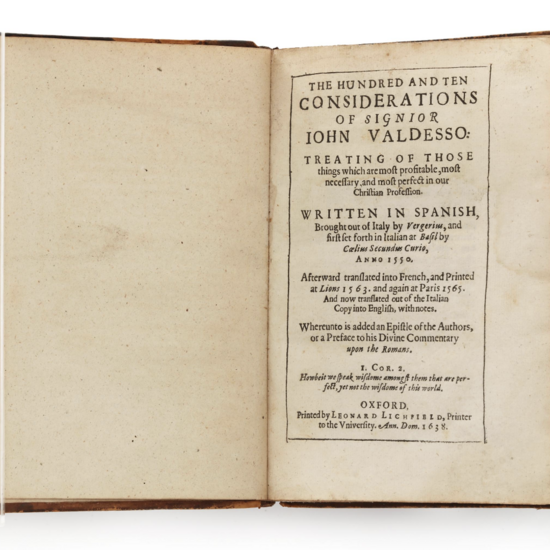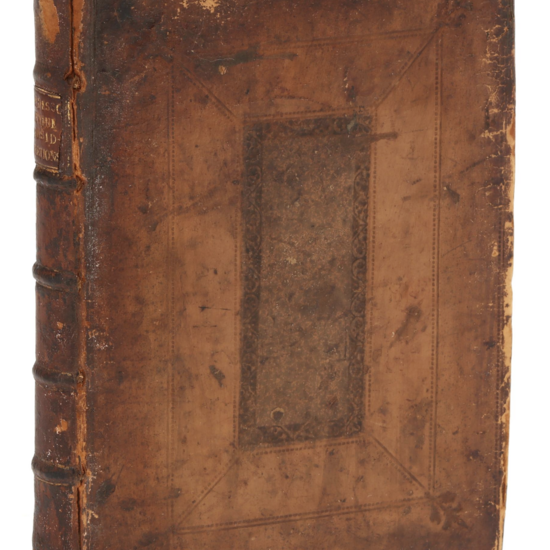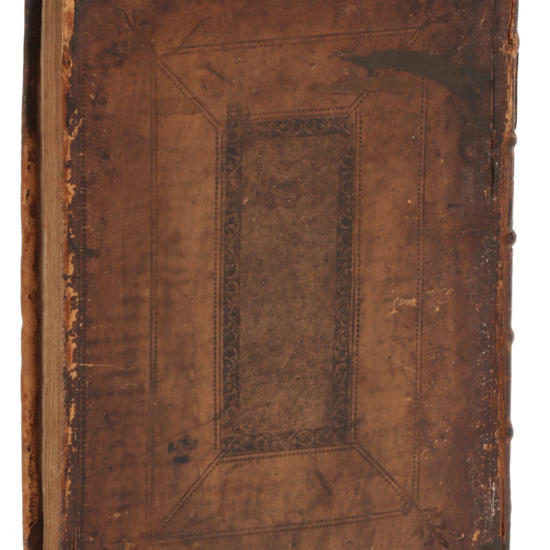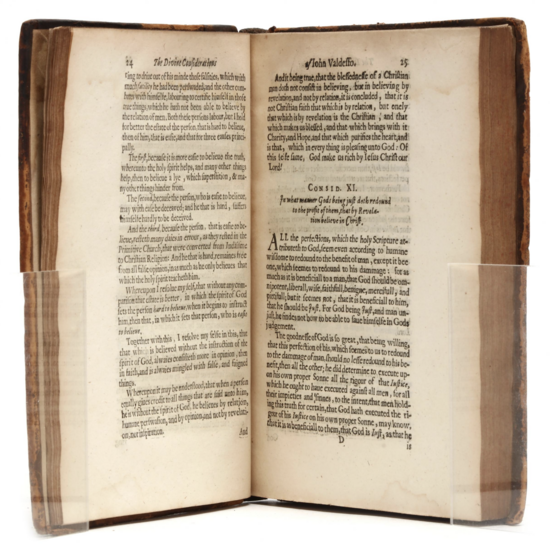The hundred and ten considerations of Signior John Valdesso: treating of those things which are most profitable, most necessary, and most perfect in our Christian Profession. Written in Spanish, Brought out of Italy by Vergerius, and first set forth in Italian at Basil by Cælius Secundus Curio, Anno 1550. Afterward translated into French, and Printed at Lions 1563. and again at Paris 1565. And now translated out of the Italian Copy into English, with Notes. Whereunto is added an Epistle of the Author's, or a Preface to his Divine Commentary upon the Romans. I.Cor.2. [...]
Autore: VALDÉS, Juan de (ca. 1490-1541)
Tipografo: Printed by Leonard Lichfield, Printer to the University
Dati tipografici: Oxford, 1638
4to (197x146 mm). [32], 311, [13] pp. Collation: *-****4 A-Rr4 Ss2. Woodcut initials and printer's decorations. Blind-tooled leather boards, with raised bands and gilt title on spine (boards scuffed, with significant edgewear, small losses to leather and cracking at joints, light cracking at front hinge, binding still sturdy). From the collection of Prof. Roberto Severino, Washington, D.C. Pages lightly toned with minimal foxing and occasional small chip or frayed bottom edge, light damp staining throughout, small ink stains in the lower margins of pp. 252-253 not affecting the text. A good, genuine copy.
Extremely rare first English edition of this collection of letters and essays put together by the author's friends, in the transaltion of Nicholas Ferrar (1592-1637), the founder of Little Gidding, the ‘Arminian Nunnery', where the Ferrar family lived under a definite religious rule from 1625 to 1646. The edition also contains a publisher's note to the reader, the Considerations by George Herbert (1593-1633) with remarks concerning the dubious and offensive passages in the text, Curione's introduction (dated from Basle, May 1st, 1550), Thomas Jackson's approbation, a commendatory letter of Herbert to his friend Ferrar, the dedicatory epistle of Valdes to his Commentary upon the Romans addressed to Giulia Gonzaga, and the errata.
The Spanish huminist and religious reformer Juan de Valdes was mostly active in Naples, where he became the spiritual center of a group of prominent men and women anxious for reform and spiritual revival in the church, to whom belonged, among others, Giulia Gonzaga and Vittoria Colonna. Though he remained a Catholic, he paved the way for Protestant ideas by his emphasis on religious feeling and his disregard of ecclesiastical authority; and after his death, many of his friends, among them Peter Martyr and Bernardino Ochino, left the Catholic Church.
“The Spanish original [Ciento y diez Consideraciones] of Juan de Valdés Hundred and ten divine considerations is lost, but there have been published twelve editions of translations. From Italian [Le Cento e dieci divine Considerazioni, first printed in 1550] they have been translated into five other languages. Three editions appeared in English. To the editor of the first English translation, who scrupulously hesitated to publish it, on account of certain passages in the book, George Herbert wrote in 1638: ‘I wish you by all means to publish it, for these three eminent things observable therein: First, that God in the midst of Popery should open the eyes of one to understand and express so clearly and excellently the intent of the gospel in the acceptation of Christ's righteousness (as he sheweth through all his Considerations), a thing strangely buried and darkened by the adversaries, and their great stumbling block. Secondly the great honour and reverence which he every where bears towards our dear master and lord, concluding every Consideration almost with his holy name, and setting his merit forth so piously, for which I do so love him, that, were there nothing else, I would print it, that with it the honour of my lord might be published. Thirdly, the many pious rules of ordering our life, about mortification and observation of God's kingdom within us and the working thereof, of which he was a very diligent observer. These three things are very eminent in the author, and overweigh the defects (as I conceive), towards the publishing thereof' […] Soon, after the death of Valdés, Vermiglio and Occhino left Italy, where liberty of preaching was no longer left them. For a short period the press at Venice was still suffered to spread evangelical literature. The Benefit of Christ was printed there and circulated in tens of thousands of copies. About the year of the opening of the Council of Trent several works of Juan de Valdés were published at Venice. Together with his brother's dialogue on the sack of Rome, there appeared Juan's Dialogue between Mercury and Charon, his Christian Alphabet, and seven of his tracts on the fundamental doctrines of spiritual Christendom. In 1548 such a licentiousness of the press was stopped. Valdés' Considerations were printed at Basle, where they appeared in 1550 in Italian. The Commentaries on the Romans and on the first epistle to the Corinthians were edited in 1556 and ‘57 at Geneva. One of the tracts was twice published, in 1554 and 56, in Germany in a Latin translation, of which a German and a Polish translation were made and very soon printed. In the Neapolitan realm persecution grew heavy ; some withdrew beyond the Alps, many recanted, many suffered capital punishment. Giulia Gonzaga, who strictly kept to the faith imbibed by the guidance of Valdés and to the practice recommended her by him, was summoned to Rome, but death released her from more painful and fearful experience, at her retreat in the Neapolitan convent, in the year 1566. Probably the Roman Inquisition seized, after her death, the letters which Carnesecchi had written to her. He was imprisoned. In vain he urged, that the doctrine of Valdés on justification could not be considered to have been heretical, as long as the Council had not determined otherwise; that high authorities and dignitaries had adhered to it; that he himself, after always fluctuating in his mind, had at last acquiesced in what the Council had ultimately decreed and the Pope had approved. He ingenuously confessed, it is true, as for the relation of inherent justice to that which is imputed, that he, not knowing exactly to discern the difference between the opinion of Valdés and the determination of the Council, was not yet quite resolved, whether he ought to condemn Valdés' doctrine on this point or not; but he declared he would submit to his judges, his intention being, entirely to conform himself in this as well as in all other articles to the orthodox catholic faith. On some captious question he also reminded them of his not being a theologian. He was beheaded and burnt, in 1567. Soon every spark of evangelical life was choked within the reach of the Inquisition” (E. Boehmer, Bibliotheca Wiffeniana. Spanish Reformer of two centuries from 1520. Strassburg-London, 1874, I, pp. 73 and 79-81).
Boehmer, Op. cit., pp. 127-128, no. 107; F. Madan, Oxford Books, Oxford, 1895, I, 211, no. 2; W. Salloch, Catalogue 344, Ossining (NY), 1977, no. 256; Quaritch, Catalogue 280, London, 1871, p. 148.
[13018]

